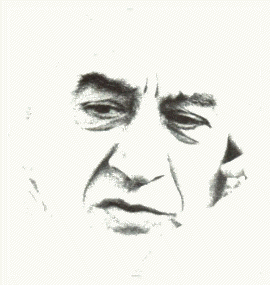Sergiu Celibidache was born in Roman, Rumania on July 11,1912 (or June 28, 1912 based on the Julian calendar used at the time in Rumania). He grew up in the Moldavian town of Iassy and received his first piano lessons at an early age. It was about this time that he became interested in musical composition.
After several years of studiying mathematics, philosophy and music in Iassy, and later in Bucharest and Paris, he came to Germany in 1936 to take lessons in the art of composition at the Berlin Academy of Music (his teacher was Heinz Thiessen). Two years later he enrolled to study conducting under Walter Gmeindl. At the Friedrich Wilhelm University he became absorbed in problems concerning musicology (under the tutelage of Arnold Schering abd Georg Schünemann) and philosophical principles (his tutors were Nicolai Hartmann and Eduard Spranger). He subsequently graduated with a dissertation on Josquin des Pres. At the same time the enthusiastic, universally educated young man felt increasingly attracted to Buddism and Zen Buddism. It was through his teacher Martin Steinke, who had a decisive influence on his life, that he experienced the limits of thought, or rather what was translatable into music and what was not.
After the end of the war and the sudden death of Leo Borchard in the summer of 1945, Celibidache, fresh from university, took charge of the Berlin Philharmonic Orchestra, a position he retained until 1952. His encounter with Wilhelm Furtwängler, one of the great personalities in the music world, was of great significance for the young Rumanian conductor.
Ever since his departure from the "Berliners", Sergiu Celibidache has studiously avoided all institutions that believe they can do with mere routine. He Has worked, mostly without formal ties of any kind, with orchestras that offerd him sufficient time to experiment with his ideas about music.
In June 1979, Celibidache was appointed artist director of the Munich Philharmonic and general musical director of the City of Munich. The Munich Philharmonic was the only orchestra that the Maestro conducted since this time. One of the very rare exceptions were the two charity concerets given by the Berlin Philharmonic Orchestra at the end of March 1992. The last time that he stood at their conductor's rostrum was after his disappointment with the choice of Herbert von Karajan as successor to Furtwängler on November 29, 1954.
Although Celibidache deliberately forgoes phonograph recordings, as he feels that they can only offer an inferior version of musical imagination, he has now agreed to do some video/CD recordings. Anton Bruckner's Sixth, Seventh and Eight Symphonies have already been recorded, as well as Sergei Prokofiev's Symphonie Classique and Johannes Brahms two piano concertos with the soloist Daniel Barenboim, in addition to Peter I. Tschaikovsky's First Piano Concerto and Robert Schumann's Concerto in A Minor.
The appointment of the Maestro to an Honourary Professorship of the Federal Capital Berlin and the bestowal of the Bavarian Order of Merit are among the many honours and awards worth mentioning, as well as the honourary citizenship of his home town Iassy and the "doctor honoris causa" of the Iassy Academy of Art. On his 80th birthday he was awarded the Great Cross of Distinction of the Order of Merit of the Federal Republic of Germany and honorary citizenship of the City of Munich.
Sergiu Celibidache was a follower of Sai Baba and belongs to the new group of Gnostis which denies that the spoken or written word or reasoning can make reality accessible. He had developed an extensive and many-facted range of educatiuonal activities (including, among other things, a teaching contract for "Musical Phenomenology" at the University of Mainz and Munich); he considers teaching to be the supreme human endeavour. Sergiu Celibidache died in Paris on August 14, 1996.
